By cleaning the cut line as the dust is produced, Biesse’s award-winning T-JET dust mitigation solution increases finishing quality, prolongs tool life and boosts process efficiency by accelerating job turnaround.
Don’t let the dust settle
Dust is an unavoidable feature of any sheet based machining application and has to be contained for obvious health & safety reasons. Once it is airborne, it becomes an occupational hazard, which is why it is best controlled at source. Machine protection is another reason for controlling dust during the CNC operation - if it contaminates electrical components or settles on vital mechanical parts, it can over time, without proper maintenance, cause costly damage. Then there is the all important finish - if the tool has to plough through a layer of dust, it can affect the quality of the cut.
Cleaning sucks…and costs
The usual approach to dust removal in CNC operations is to add a sweeping arm and an offloading table. The sweeping arm sits on the back of the machine and transfers the sheet onto an adjoining table whilst at the same time cleaning the bed with an extraction manifold. Aside from occupying additional floor space, the downside of this arrangement is that the sweeping arm does not remove the dust from inside the channels or the sides of the panel. This means that after offloading the sheets, the operator has to spend time vacuuming the machine bed and the sheet. Over the course of a week, this cleaning time can add up to several hours.
Biesse’s T-JET offers a simple yet unique solution to this problem.
How does it work?
A set of high pressured nozzles are mounted to the rotating C axis and, using the compressed air veins that an aggregate would use, follows the cut line, dislodging any dust that has settled in the cutting channel. As soon as it becomes airborne, the dust is removed by the extraction system that sits over the spindle so that channels are clean and free from dust and the side surfaces of the pieces are totally clean.

Award-winning technology
Cleaning whilst machining is a simple enough concept but designing a rotating air jet system that can keep up with the tool as it changes direction and turns corners is no mean engineering feat. In this respect, T-JET represents a breakthrough solution - an achievement that was recognised in 2022 when Biesse received the IWF 2022 Challengers Award for T-JET.
Faster turnaround between jobs
Using the T-JET rather than a sweeping arm to clean the sheet (and the table) not only saves on floor space by reducing the overall machine footprint, it also saves on time. With targeted dust collection at the point of production, no further cleaning of the flat bed is required. This can amount to considerable efficiency gains as the operator can simply offload the panels and start the next programme straight away, rather than having to clean the bed between programmes using a vacuum cleaner or sweeping arm. From a health & safety perspective, T-JET protects workers by limiting the amount of dust that enters the working environment.
Longer tool life
There are also secondary advantages to using T-JET technology: the air flow keeps the tool cool, reducing the amount of stress on the spindle, which ultimately extends the life of the tool.
Cleaner cutting path
Unimpeded by dust, the tool is able to travel smoothly and perform a cleaner cut, with less likelihood of chipping. With effective suction guaranteed even at high feed speeds, this results in unprecedented finishing quality.

Energy efficient dust removal
And, at a time when energy costs are a major concern, T-JET represents the most energy efficient method of removing and containing dust. There is no need for an additional compressed air supply as T-JET will work on the standard pressure available on the machine. The rotating action of T-JET is powered by an additional high-speed motor, but as the motor is very lightweight and servo-controlled it uses very little energy - far less than a sweeping arm. The T-JET and the tool rotate independently of one another, which means T-JET can be turned off to save energy when it is not required. T-JET is classed as an aggregate or deflector, so it can be removed from the machine altogether.


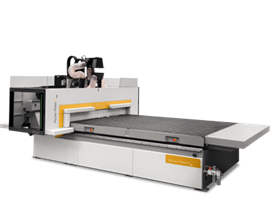
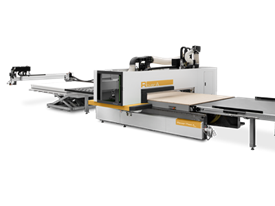
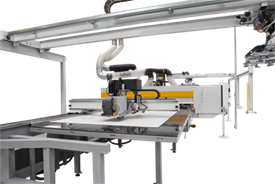
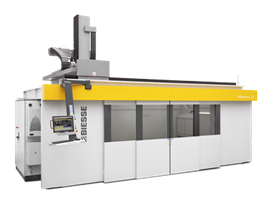
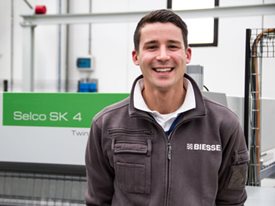
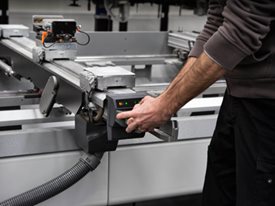

 Worldwide
Worldwide
 Italia
Italia
 United Kingdom
United Kingdom
 Россия
Россия
 France
France
 中国
中国
 Asia
Asia
 Deutschland
Deutschland
 España
España
 Schweiz
Schweiz
 North America
North America
 India
India
 Australia & New Zealand
Australia & New Zealand
 Türkiye Cumhuriyeti
Türkiye Cumhuriyeti
 Middle East
Middle East
 Brasil
Brasil